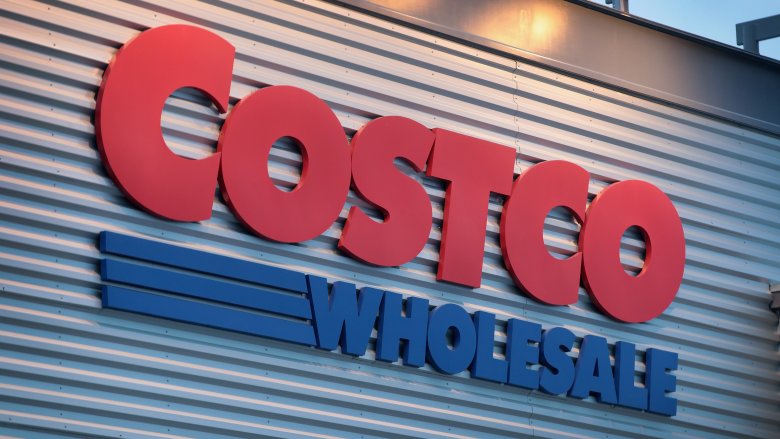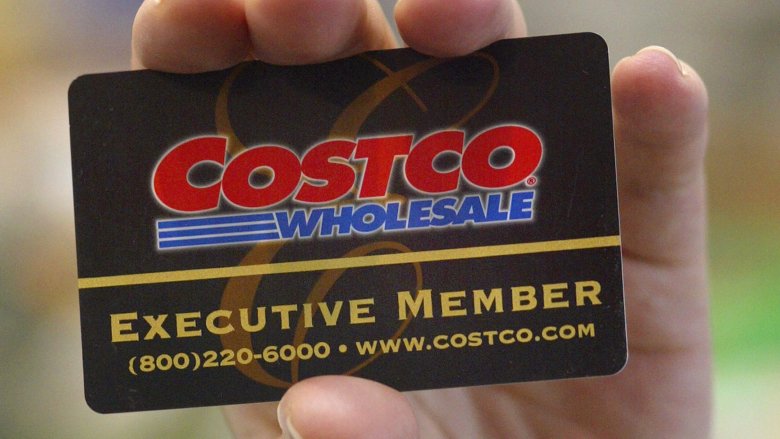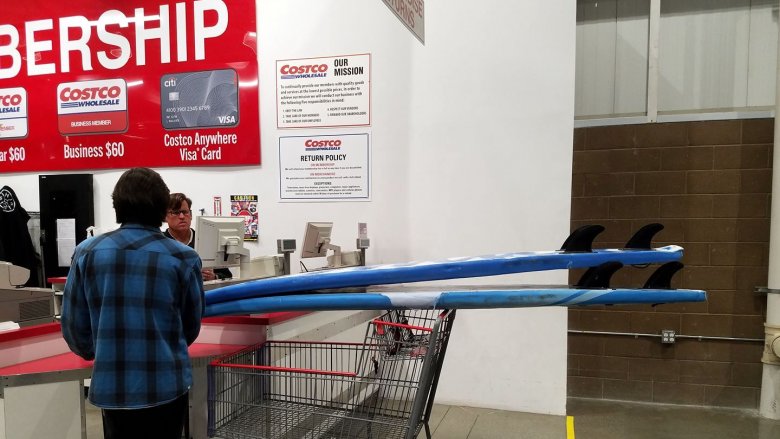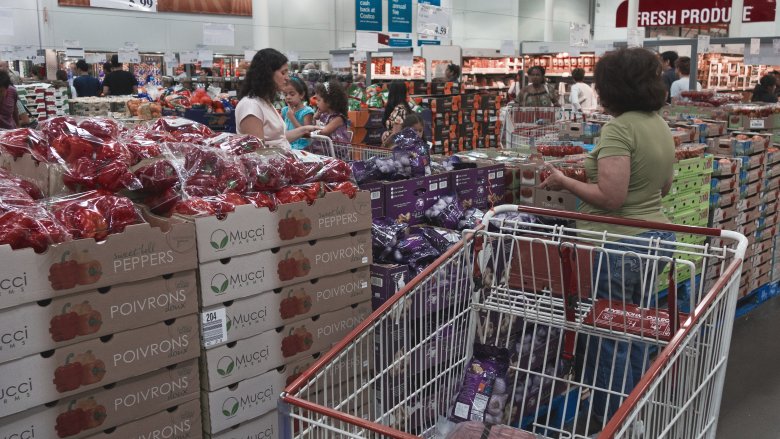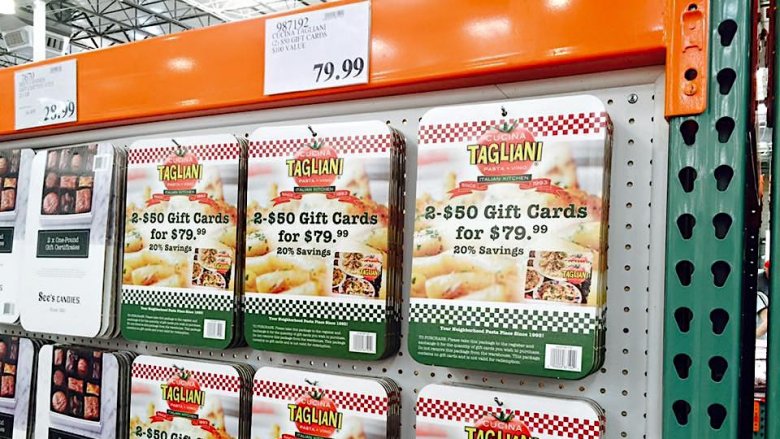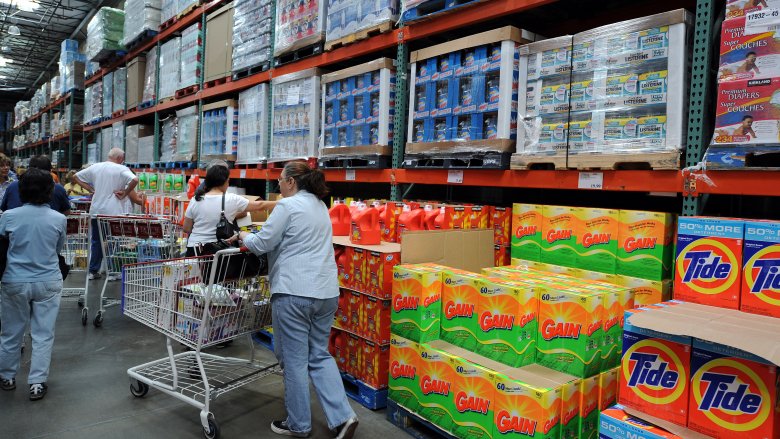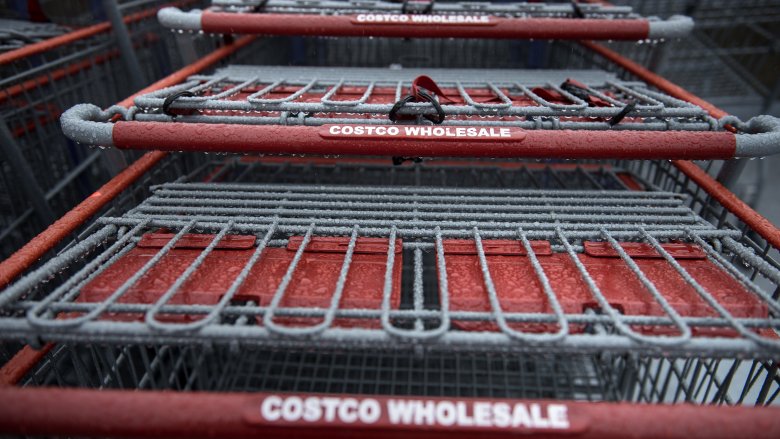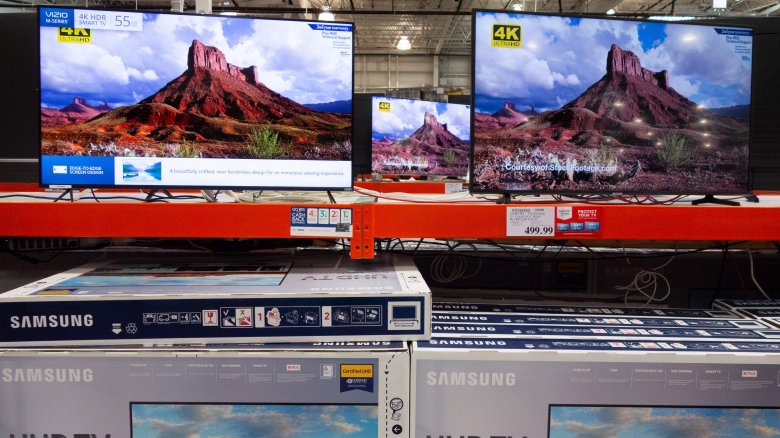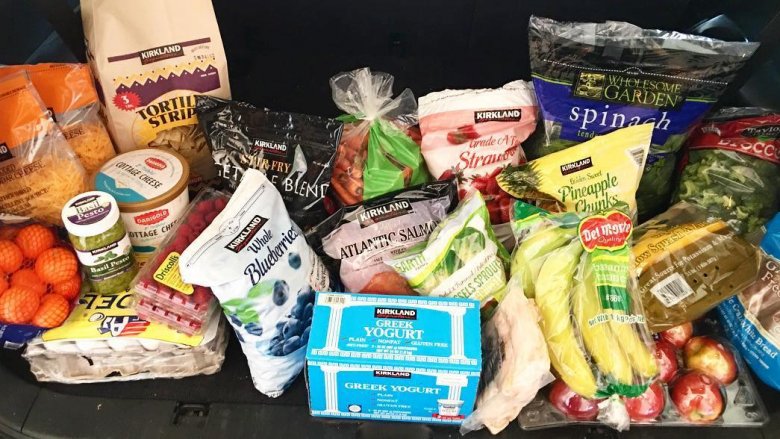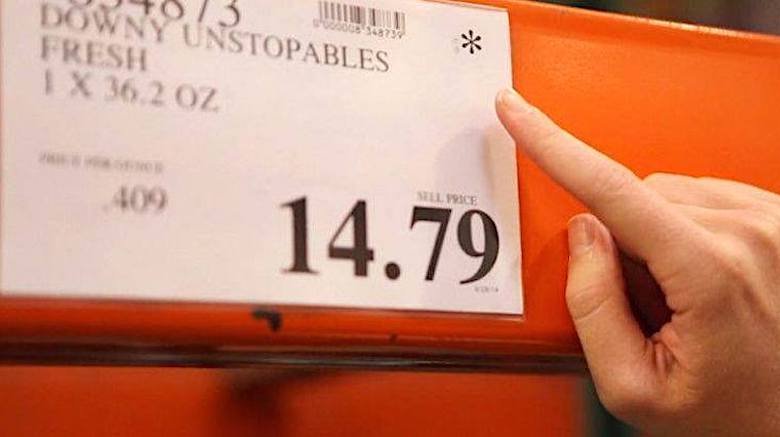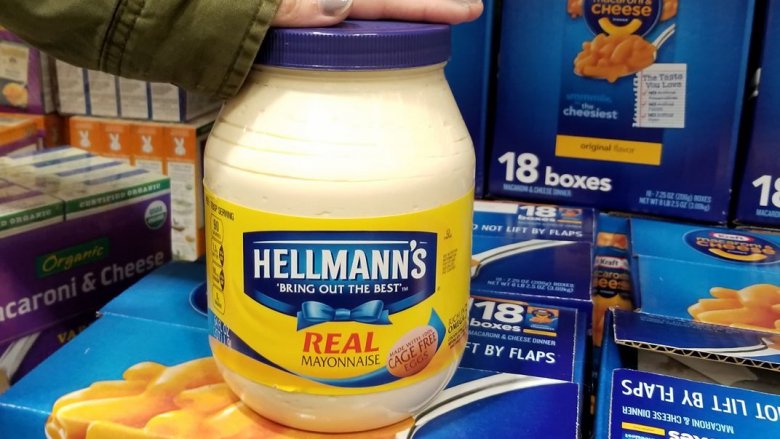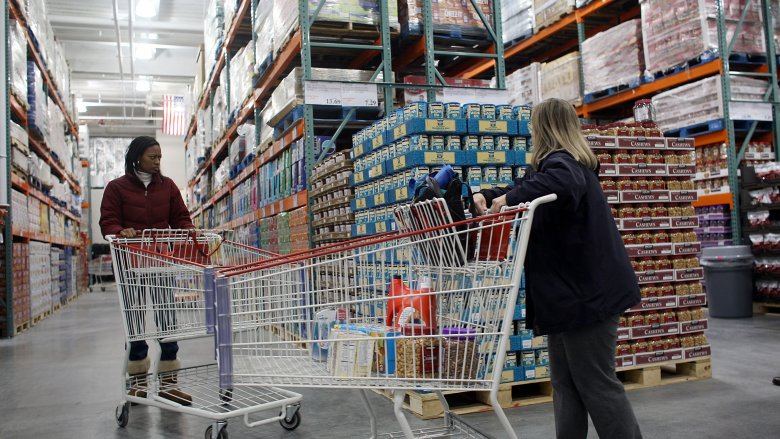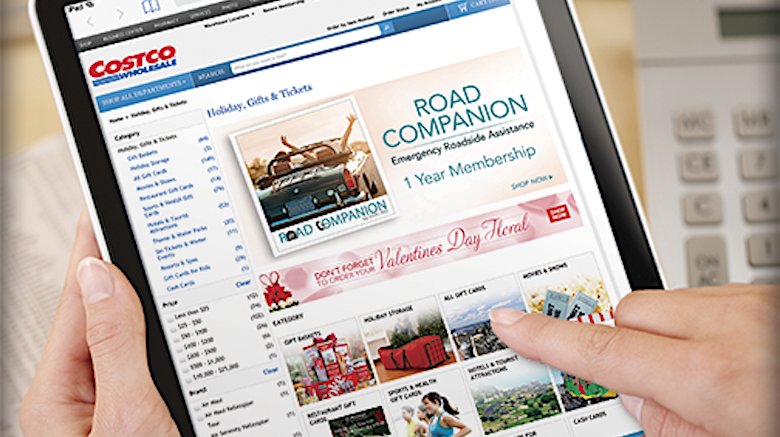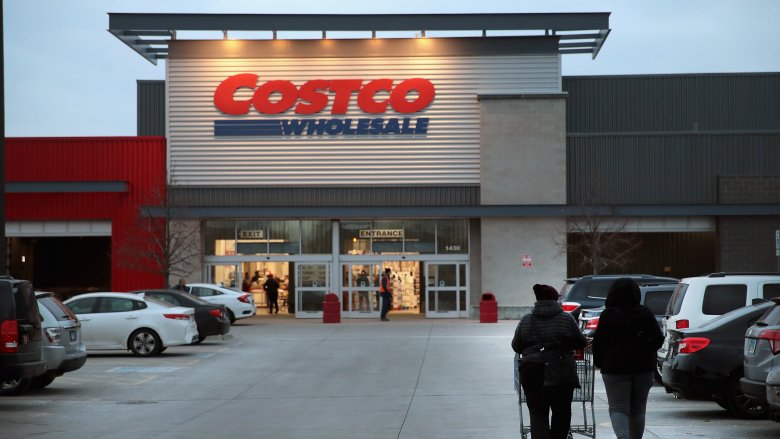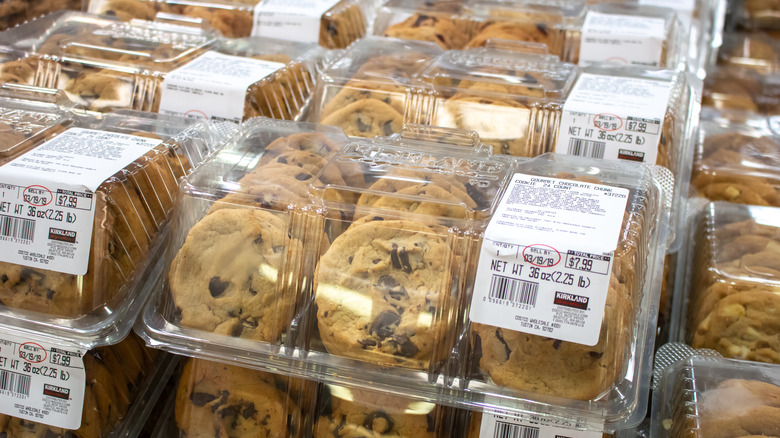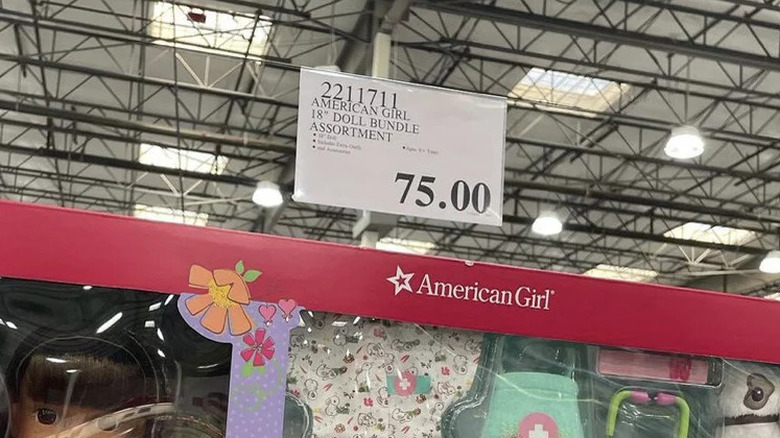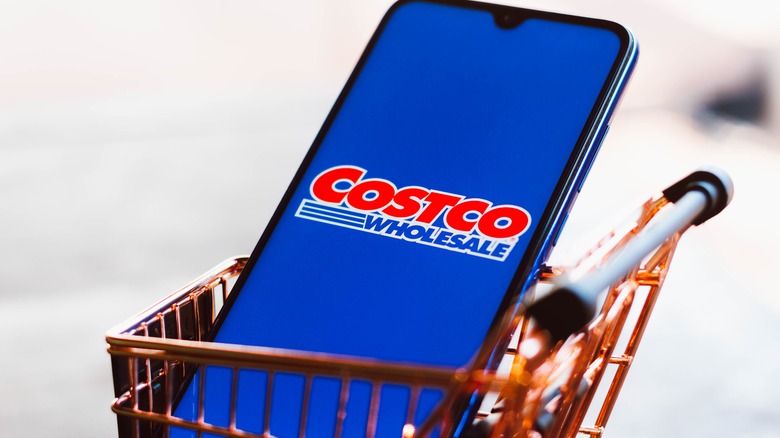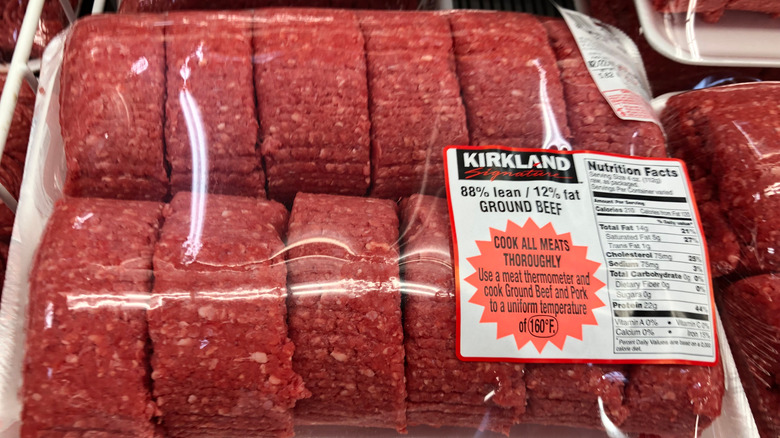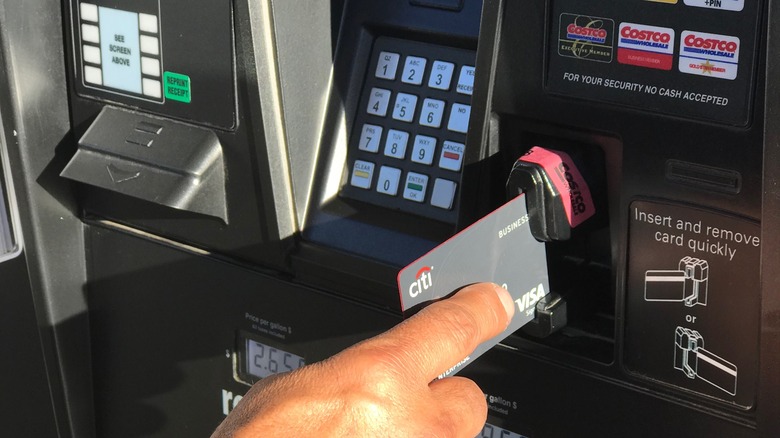Mistakes Everyone Makes When Shopping At Costco
Nobody really needs to be told how to shop, right? The basics are fairly simple — make a list (or don't), drive to the store, load up your cart, check out. We've all been doing it on auto-pilot for years.
But when you shop at Costco, the rules are a little different. As a card-carrying member, you're probably paying for a ton of benefits that you might not even know you get. You also might be making incorrect assumptions when it comes to the items you select.
Of course, there is no official Costco-sanctioned method to shop the warehouse store "the right way," but using that basic "make a list/drive to the store/load up the cart/check out" technique means you could be missing out on free services, or worse, leaving money on the table in the form of cash money and wasted groceries. Don't make these mistakes next time you hit your favorite bulk buy paradise.
You're not upgrading your membership
Costco has two options when it comes to personal memberships — Gold Star ($60) and Executive ($120) — and if you haven't upgraded to Executive yet, you're missing an opportunity to recoup some (or all) of that annual fee. While it might sound a bit counterintuitive to pay twice as much for the same access to the warehouse store, depending on your spending habits, it could be well worth it.
At the Executive level, you receive two percent cash back on most purchases (certain items don't apply, like alcohol in some states, and tobacco products). According to Costco's math, if you spend $500 a month (or $6,000 a year), you're looking at a rewards check of $120, and in effect, getting your membership totally free. The more you spend, the more you get back — up to $1,000 a year. Even if you don't come close to that maximum, anything over $60 in rewards is money back in your pocket. So what are you waiting for? Go upgrade that membership — Gold Star is so last year.
You're not taking advantage of this money-saving policy
It always seems to happen... At least one of the items you bought on your last Costco trip is now on sale, and you're kicking yourself for missing out on the savings.
The good news: There's a store policy that works in your favor here. The bad news: You have to stand in the return line to take advantage of it.
Yes, that line — the one that can rival the lines of Disneyland's most popular rides. But thanks to Costco's price adjustment policy, the wait can be well worth it, because the store will refund the difference between the price you paid and the sale price of any items within 30 days of purchase.
When it comes to whether you need the original receipt to get the money back, Rather-Be-Shopping.com advises that some stores require it while others do not. Your best bet is to stash those slips away for a month and check out the prices of your recent purchases next time you shop. You might be in for a hefty refund.
You're buying produce wrong
It's easy to get swept away by the bargain basement prices in Costco's produce department. A few dollars for what seems like 75 pounds of spinach? How could that not be worth it? Well, unless you're channeling your inner Popeye on a daily basis, it probably isn't. Take it from one Costco employee who told Business Insider, "While our produce department is one of the best in the business, I personally don't eat veggies fast enough to buy in bulk, so two-thirds of it will spoil before I eat it."
But that's not to say you should avoid all of Costco's produce — you just need to know what to buy. Unless you're feeding a large family, it's probably best to avoid things that ripen or spoil too quickly, like peaches or a tub of leafy greens. Buy fruits and vegetables that last, like apples and carrots, and take advantage of produce that can be refrigerated, like avocados. If you put half (or more) into the fridge while you work on the other half, you won't have that pressure of suddenly needing to consume a dozen at once.
At the end of the day, no matter how much you save on that flat of stone fruit, it's just not worth it if you end up throwing most of it away.
You're leaving money on the table
If you're not buying gift cards at Costco, you're doing it wrong, plain and simple. These prepaid cards for restaurants, coffee shops, movie theaters, and other attractions aren't just a good generic gift option — they're a gift you should be giving yourself, too.
But why would you bother to buy a gift card for yourself? Why not just pay the restaurant directly? Because you're leaving money on the table, that's why. See, Costco offers $100 gift cards to these establishments at a sizable discount — typically a 20-25% savings. Since you were going to spend $100 on movie tickets eventually anyway, you might as well just buy the gift card and keep the $20 to $25 in your pocket. This system makes sense for any goods or services that you use consistently or even for a one-off night out to a nice restaurant. Hey, nobody can fault you for saving a few bucks on date night.
You assume it has the best prices
Costco is known for its amazing deals, but — perhaps somewhat surprisingly — the warehouse store doesn't always have the lowest price in town.
While it is true that Costco frequently beats out the competition, extensive price comparisons prove that there are instances in which you'll find bigger savings elsewhere. Take Business Insider's Costco to Amazon price comparison, for instance. Of 100 products, 79 were cheaper at Costco. Yes, numbers like that seem to point to the warehouse store as the best bet, but for items like Kleenex and Huggies diapers, you're better off with Amazon. Similarly, in a Walmart price comparison, Costco mostly has the upper hand, but according to The Kitchn, certain groceries proved to be a better value at Walmart. Buying things like bacon, Greek yogurt, and whole chickens at the big box store will actually save you a little money.
Is the savings so great that you should drive across town to Walmart just for a pack of bacon, or pay a shipping fee on an item from Amazon? Probably not. But if you're shopping there anyway, you might as well get the lowest price.
You skip it because you're single
You don't need to be a family of six to make Costco work for you — the warehouse store can be a smart choice for singles and couples, provided you're making the right decisions when you shop.
As tempting as many of the fresh food items can be, it's best to avoid anything that will spoil quickly. What are the chances of one person drinking two gallons of milk in a week? That's the key when it comes to perishables: If you won't consume it all before the expiration date, you've got to skip it. (Yes, even if the price for two gallons of milk is the same as one quart from your local grocer — painful, we know.) This means the freezer section is your friend, and so are individually wrapped snacks. A ginormous bag of Skinny Pop will likely go stale before you get to the bottom, but tiny single-serve bags won't. For household items like toilet paper, if you have a place to store the dozens of rolls, go for it. But when it comes to giant bottles of bleach and bulk disinfectant wipes? They actually lose efficacy if stored too long, so unless you run a cleaning service, probably not the best buy for you.
You're not using the concierge services
The competitive prices on electronics are probably enough to convince you to buy your next TV or laptop from Costco, but when you make the purchase at the warehouse store it comes with another benefit you might not know about: The Costco Concierge Service.
This service, which applies to most major appliances and electronics (including items like cameras, printers, and home security systems), comes with two major perks. The first is free technical support. Experts are available seven days a week to help you with initial set-up and troubleshooting, and will definitely come in handy when you get stumped. Second, it extends the manufacturer's warranty of the product to two years from the date of purchase. Since most items typically come with a one-year warranty, this is huge. A whole extra year of protection, free of charge? Yes, please. (If you happen to pay using your Costco Anywhere Visa Card, that warranty gets extended even further, up to seven years maximum.)
You're skipping the Kirkland products
As you wander up and down the aisles at Costco, it's hard to miss all the store brand products — according to Kiplinger, about 20% of all the products in the warehouse boast the Kirkland label. And if you're skipping over them in favor of their brand-name counterparts, you're making one of the biggest Costco shopping mistakes of all.
First things first — no, Kirkland doesn't always win when it comes to product comparisons. Consumer Reports indicated (via Kiplinger) that though less expensive, the private-label toilet paper and facial tissues ranked lower than national brands when it came to quality.
But plenty of the Kirkland products are cheaper, consistently outperform when it comes to both quality and taste, and in some cases may even be manufactured in the very same factories as national brands. Just a few of the areas where Kirkland can brag: The store brand has beaten Oscar Meyer in the bacon game, is one of "a few imported oils that met international and U.S. standards," and has bested Grey Goose vodka more than once in blind taste tests. Even Kirkland batteries, though they might not last as long, come out ahead thanks to the value provided by the low price.
In other words, don't be a brand snob — you could end up paying more for an inferior product.
You're not paying attention to prices
Aside from merely telling you the price you'll pay for an item, Costco's price signs have a hidden meaning, too. You'll need to pay attention to get the best deals, and most importantly, to know if your favorite item is about to disappear forever. According to Uproxx, here's how to decode those signs:
If the price ends in .99 or .98: This indicates a regular retail price, and probably doesn't translate to any huge savings compared to other retailers. If the price ends in .89, .79, .69, .59, .49, .39, .29, .19, or .09: This indicates Costco got a manufacturer's deal, meaning they can offer these items at a steeper discount than others. If the price ends in .97: This indicates your biggest savings. These are items that need to go, and are priced at a discount. If there happens to be an asterisk in the upper right corner of the sign, act fast and stock up, because this means that the product is likely going away for good.
You don't consider shelf life
Although it might seem like a great deal, not every bulk buy ends up being a money saver in the long run, particularly if that bulk buy expires before you get a chance to use it. Case in point: Groceries.
Not all grocery items last forever — even those canned, dried, and bottled — and those are the ones you have to watch out for. Take condiments, for example. While the six-pack of ketchup bottles might seem like a bargain, you have to remember that the tomato-based product only keeps for six months once opened, and one to two years unopened. Similarly, you only have a few months to use up that giant jar of mayo, barbecue sauce only lasts about five months after opening, and some hot sauce brands recommend finishing a bottle within six months.
When it comes to canned and dried goods, you've got a little more leeway, but there's a limit there, too. Dried pastas give you one to two years shelf life, and while white rice keeps for up to five years, brown and wild rice only keeps for up to eight months in the pantry. As for canned goods, acidic products like tomato and citrus will only keep for about 18 months, while most other products hang in there for up the five years.
The point is, you've got to be selective or sometimes a good deal just ends up being a waste of good food.
You let the layout confuse you
Spoiler alert: Costco's layout is confusing by design. They want you to get lost in their labyrinth of tempting bargains so you spend all the money.
Think about it... you shopped at the warehouse store just last week, but somehow, some way, the layout is very different this time around. Why isn't the coffee in the same spot? Why isn't the chicken broth where it was a few days ago? According to one former employee on Quora, this bait and switch is no coincidence. "I worked for Costco for 13 years. They purposely move products around to different locations and are constantly rotating a certain percentage of their inventory to new products. This creates a 'Treasure Hunt' experience as you shop and helps you discover new products that you may not normally see on your shopping visits." In other words, you're much more likely to impulse buy.
More tricks the retailer uses? The fresh food — AKA the groceries you really came to buy — are located at the back of the store so that you're forced to walk past all those amazing deals and hopefully put them in your cart. Costco also forgoes any aisle signage — another effort to get you to peruse all the products and buy, buy, buy, if even you didn't know you needed 'em. If you don't want to spend more than you planned, don't let their layout lead you astray.
You're not comparing prices online
You might assume that the prices of items inside the Costco warehouses are the same as the prices on Costco.com. You would be wrong. That's why it pays to check the online price before you buy.
Every so often, in addition to the monthly coupon book, members will receive another booklet of sale items, but this one is for online purchases only. (If you don't get the mailer, you can check the current offering at the Exclusive Online-Only page of Costco's website.) While some of these items are truly only offered online, like bathtubs or sinks, you'll find that others are actually available in the store — but the catch is, even if you can buy the item in the store, the sale price won't apply. You never know what you might save on — maybe it's $20 off a set of sheets, or $100 off a piece of jewelry. The bottom line is: If you can afford to wait a few days to get the item, shopping online can save you some serious money.
Non-members aren't taking advantage of benefits
Here's the greatest Costco hack of them all: Don't pay the membership fee, but take advantage of the member benefits — at least some of them.
As a non-member, you probably don't realize all the perks you're missing out on. Have a prescription to be filled? That slip of paper will get you in the door to do so, no membership card required. While you're there, you can also get free health and wellness screenings and even flu shots. Just want to buy some booze? In 12 states you can do so without a membership — just tell the employee at the door that's why you're there. The same thing goes for the food court, but if it's located outside, you don't even need to worry about getting in. Even a regular ol' shopping trip is a possibility, as long as you have a Costco Cash Card. You can use it to gain entry to the store and even pay for your items (though a member does have to buy the card in the first place).
You aren't varying the quantity of cookies and chicken to get big savings
The whole notion of Costco is that customers save money by buying in bulk — purchasing a lot delivers a lower per-unit cost. But Costco members can access even more savings by utilizing a little-known option that's essentially super-bulk. According to Costco employees, baked goods may be purchasable by the case. The dough for things like private-label bagels, bread, and cookies arrives frozen at a Costco store, where it's baked and then packaged. Customers can ask to buy a whole case of the dough. Say a plastic shell of 24 cookies costs $7.99 — a case of 180 will run $34.99. That moves the per-cookie cost from 33 cents down to 19 cents. Individual stores may also sell deli meats, seafood, or steaks by the case — just ask someone in the appropriate department.
Conversely, one doesn't always have to buy more at Costco in order to spend a little less. Costco's rotisserie chickens are a deal at $4.99 in most areas. But if that's just too much meat, shoppers can reportedly ask a deli employee to cut the chicken in half. Not only do they have the tools to do it much more efficiently than members could at home, but it knocks a few dollars off the Costco bill. We should note that the TikToker sharing this tip says they have not tried it for themselves, so it's not guaranteed that this will work at your local Costco.
You aren't looking out for 00 and 88
Those deceptively simple black-and-white Costco price tags carry a lot of information. The two-digit number on which the price ends can denote a regular price (.99), a temporary discount (.89, for example), or a product that won't be restocked (.97). Costco customers should keep their eyes open for the relatively rare price tag codes of .00 and .88. Items labeled with a price ending in one of those two numbers is a subtle call out to customers — these products are priced to move, and to move quickly. Both of these two-digit designations are used on quirky, misfit, products that an individual Costco outlet has decided it doesn't want around anymore taking up space.
The .00 or .88 signifier might also show up on a one-off item that the store doesn't plan on restocking. It could also be a product that was purchased, brought home, used gently, and then taken back to the store under Costco's generous returns policy.
You're not using the Costco app
A Costco membership card isn't just a passport to shop for bulk goods, electronics, and housewares in hundreds of gigantic warehouse-size retail outlets. That membership also provides access to Costco's smartphone app, where a number of tools, benefits, and tips await, all of them designed to save dues-paying customers a moderate amount of money. Some items are only available from Costco's e-commerce division, which can be accessed on the app, along with discounts that might not be found in the retail stores. Costco's app also allows users to make a shopping list. Not only does that cut back on the hours spent wandering around a store, looking for needed items, but it can keep a customer on track to buy only what they came in for, making them less susceptible to potentially expensive impulse purchases.
The Costco app also stores a member's store records. All in-store and online receipts live inside of the application, where they're easily accessible in case of returns or to keep track of for budgetary purposes. It also saves time, because a membership card function is available — no more digging around in purses and wallets upon entry to the store or at the cash register.
You're not buying chubs
Compared to regular supermarkets, Costco sells ground beef for cheap. Regular, non-organic hamburger-ready beef is sold in wrapped trays that vary by weight (and thus price). According to a Costco employee on Reddit, those packages of ground beef are prepared in the store. Not wanting to toss the trimmings removed from steaks and other premium cuts, a meat department worker will mix that excess fat with extra-lean, very low-fat beef that arrives at Costco in industrial-size 10-pound packs called chubs. That makes for a good ratio of meat to fat in the ground beef while also cutting down on waste.
Costco customers can cut out the processing and mixing and just ask for a chub. That beef is very lean, somewhere between 5% and 8% fat, and sells at about 15% less than the mixed hamburger meat placed on the sales floor. To buy a chub (and only a whole chub), customers can ask someone in the meat department.
You're not using the Costco credit card
Sure, there are many methods and tricks for spending less on a Costco trip. But there's a next-level technique for driving down Costco expenses by using the store's credit card. Like many massive commercial entities, Costco offers its own credit card. A partnership with Citi, the Costco Anywhere Visa is available only to Costco members, and because they already hold that card, they don't have to pay an annual service fee to the credit provider. One of the main benefits of the Costco Anywhere Visa is that holders get 2% cash back on all of their Costco purchases, which, with big-ticket items, large shopping trips, and several visits throughout a year, can really add up.
The Costco Anywhere Visa also provides rewards when shopping at many other businesses besides Costco. Members earn 3% back when dining out and traveling (which can be booked through Costco) and 4% on gasoline and electric vehicle charging. However, as is the case with any credit card, interest rates can pile up if the balance isn't paid off in a timely or consistent fashion.
